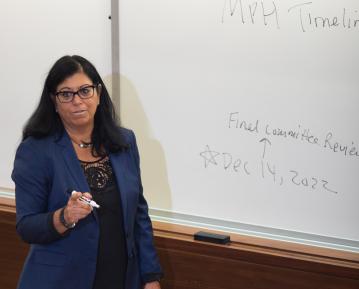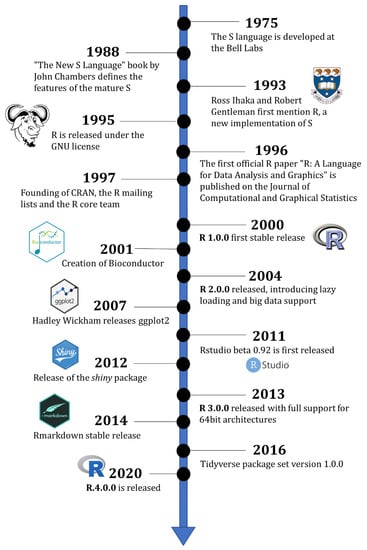Top Guidelines Of Bioinformatics Tutor
Bioinformatics Tutor Can Be Fun For Anyone
Table of ContentsUnknown Facts About Bioinformatics TutorA Biased View of Bioinformatics TutorBioinformatics Tutor Things To Know Before You BuyThe 10-Second Trick For Bioinformatics TutorWhat Does Bioinformatics Tutor Do?
First job growth is fairly lengthy, as it entails careful preparation of the subject, structuring of deliverables, and consideration of the skills and experience degrees of individuals. However, when a task has been clearly specified and implemented, it has the prospective to be recycled in future sessions with only small revisions to show updates in the area or accommodate differences in participant histories. This makes project-based learning a lasting and effective training approach in the long run, particularly in quickly advancing techniques like bioinformatics.To make certain connection and reproducibility of knowing, giving common laboratory note pads-- either electronic or physical-- is critical. These note pads serve as collaborative logs where students can record their progress, code, methodologies, and results throughout the course. Not just do they enhance understanding by urging documentation and representation, yet they likewise serve as post-course recommendation materials that participants can speak with in future research study or scholastic tasks.
Coaches play a crucial role in the success of project-based courses. Ideally, mentors ought to be active researchers with a extensive and up-to-date understanding of both the academic structures and functional applications of bioinformatics in their corresponding self-controls. Their capability to bridge complex principles and real-world application is important in assisting students browse the challenges of interdisciplinary research. Additionally, coaches also work as function models and motivate trainees to continue pursuing jobs in computational biology and associated fields.
Getting My Bioinformatics Tutor To Work
Another key element of the understanding process is offering participants the chance to offer their work to others, especially to a target market past their immediate project group. Final discussions or mini-conferences permit students to articulate their findings, get useful comments, and gain self-confidence in communicating scientific content. This presentation element is typically a favorite among students, as it verifies their efforts and highlights the real-world significance of their work.
The efficiency of this technique was confirmed by the extremely favorable responses obtained after the first training course was provided. The success triggered repeat offerings of the exact same course format in 2015 and 2016. Each iteration of the program was fine-tuned based upon individual comments and progressing finest methods in pedagogy. These adaptations ensured that the core purposes-- hands-on knowing, partnership, and applied analytic-- continued to be undamaged while broadening the deepness and breadth of topics covered.
A noteworthy visualization that recorded participant belief was a word cloud created from responses to the 2014 end-of-course study. This visual responses reinforced the program's focus on experiential learning and coach assistance.
The contributions of people such as Rustici, G., Orchard, S., Cowley, A., and Twells, R., in addition to other participants of the EBI user-training-working team, were important in improving the program structure and material. Their insights helped shape a comprehensive and adaptable model that might be adjusted to numerous institutional and regional contexts.
Rumored Buzz on Bioinformatics Tutor

Jones, Rasmussen, and Moffitt (1997) also supported for interdisciplinary learning via collective task job, noting its capability to imitate professional atmospheres and prepare pupils for future academic or sector roles. In a detailed testimonial, Thomas (2000) evaluated several researches on PBL and wrapped up that students not Learn More only carry out well academically yet additionally develop a deeper understanding of the subject issue and improved team effort abilities.
In the context of bioinformatics education and learning, innovative techniques like class video games and simulation-based training have actually additionally been employed. For example, Schneider and Jimenez (2013) introduced using interactive games to instruct organic information assimilation, enabling students to understand complicated ideas through experiential knowing. This sort of gamification enhances the hands-on understanding stressed in project-based training courses by presenting a component of enjoyable and competition, which can even more improve interaction.
Returning to the course discussed here, the lessons picked up from the execution of project-based discovering in a bioinformatics establishing have more comprehensive ramifications for other STEM fields. The methodology stresses not simply technological effectiveness, yet additionally interaction, partnership, and vital thinking-- abilities that are increasingly valued in both academia and sector.
The Greatest Guide To Bioinformatics Tutor
The scalability of the course format also makes it a viable design for other organizations. With appropriate modification based on local demands, offered sources, and participant accounts, the structure can be replicated or adjusted for usage in other clinical domains. Furthermore, the addition of organized mentorship and assessment strategies helps make sure constant top quality and measurable discovering end results.

To conclude, project-based discovering in bioinformatics provides a powerful strategy to training facility, interdisciplinary content in such a way that is both available and intellectually boosting. By highlighting cooperation, useful application, and critical questions, such initiatives not just improve private understanding however additionally contribute to the growing of a new generation of experienced and ingenious scientists.
More About Bioinformatics Tutor
An additional trick element of the discovering procedure is giving participants the chance to provide their job to others, especially to a target market past their immediate project group.In the broader academic literary works, project-based knowing (PBL) has been thoroughly researched and validated as an efficient method for promoting deep understanding, vital reasoning, and transferable abilities. Adderley et al. (1975) highlighted the worth of project approaches in higher education, keeping in mind that they advertise active discovering and autonomy. Schneider and Jimenez (2013) introduced the use of interactive games to teach organic data assimilation, enabling pupils to realize complicated ideas through experiential learning.